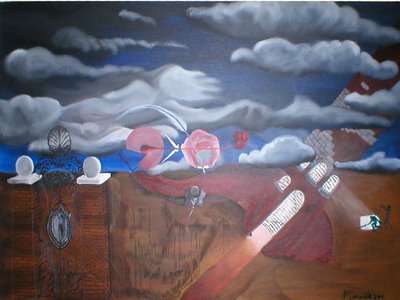
One: Who is Assad to dictate to the U.N. about a Peace Keeping Force on the Lebanon/Syria border? It is not like the U.N. is a hostile army waiting in the wings to invade Syria.
Two: Not only has Israel requested the U.N. to help monitor the border, but Lebanon has requested U.N. aid to help monitor the border.
So is the U.N. sending Peace Keeping Forces to protect Lebanonese National Sovereignty or to enhance the Hezbollah agenda and Syria National Interests? If the U.N. does nothing to prevent the arming of Hezbollah from foreign agents outside of Lebanon, why even go to Lebanon? A U.N. failure to prevent the arming of Hezbollah is a failure in the U.N. mandate to insure global peace on an unbiased basis. Failure to prevent the re-arming of Hezbollah is the validation of Mohammedan goals of terrorists and Mohammedan Middle Eastern nations to terminate Israel's existence.
Would not that failure render the existence of the U.N. as irrelevant?
***************************************************
22 Aug 2006 18:32:56 GMT
Source: Reuters
AlertNet.org
DAMASCUS, Aug 22 (Reuters) - Syrian President Bashar al-Assad on Tuesday rejected Israeli demands for the deployment of international troops on the Lebanese-Syrian border to stop what Israel says is the smuggling of arms to Hizbollah.
"This would be a withdrawal of Lebanese sovereignty and a hostile position," Assad said, according to advance excerpts of an interview to be aired by Dubai Television on Wednesday.
The United Nations is trying to assemble a force of 15,000 to monitor a truce in southern Lebanon after a 34-day war between Israeli and the Shi'ite Muslim guerrilla group Hizbollah, which ended eight days ago with an uneasy truce.
Israel wants U.N. troops to police border crossings between Lebanon and Syria to prevent weapons smuggling.
Israeli Prime Minister Ehud Olmert said stationing some of the international force at border crossings and Beirut airport would enable Israel to lift its air and sea blockade of Lebanon.
U.N. envoy Terje Roed-Larsen said on Tuesday that there were indications from senior Lebanese officials that they would request help in monitoring the crossings and that the international community would heed any such requests.
He said about 2,000 Lebanese forces had deployed along the border with Syria, but the United Nations was having difficulty attracting contributions for the international force.
Many countries have demanded a clearer mandate for the expanded U.N. force, authorised by U.N. Security Council resolution 1701 establishing the ceasefire.
That resolution also demands that Lebanon's borders be demarcated, particularly to solve a dispute over the Shebaa Farms, an Israeli-occupied strip near the border between Lebanon, Israel and Syria's Israeli-occupied Golan Heights.
BORDER DEMARCATION
Assad said, however, that his country would not draw the border until Israel withdrew from the area.
"There will be no drawing of the border in the Shebaa Farms before the Israeli forces leave it," Assad said.
"Hizbollah's victory was enough to teach Israel a lesson, that the isolation of Syria has failed and that anyone who tries to isolate Syria isolates himself from basic issues."
The Shebaa Farms is a small patch of land claimed by Lebanon, but occupied by Israel since it captured the Golan Heights from Syria in 1967. The United Nations deems the territory Syrian until such time as Syria cedes it to Lebanon.
Israeli forces withdrew from southern Lebanon in 2000, ending a 22-year occupation, but remain in Shebaa Farms.
After 29 years, Syria pulled out of Lebanon last year under intense world and Lebanese pressure following the killing of a former prime minister which many blamed on Damascus.
Assad said there was still a chance that peace could be achieved in the Middle East but that the window of opportunity could close within weeks or months.
Olmert this week rejected suggestions from within his cabinet that Israel should talk to Syria, saying peace negotiations could only be held if it stopped backing groups like Hizbollah.




No comments:
Post a Comment